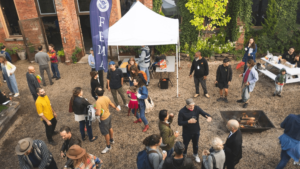How do you increase your chances of being discovered by potential ticket-buyers in search engines like Google? Event Search Engine Optimization (SEO).
SEO helps you rank in the top search engine results pages (SERPs) and keep out of “Google ghostland” (page two and beyond). Only 0.63% of searchers click past the first page of Google, whereas being in the number one spot increases the likelihood of people clicking on your link by 39.8%.
At Eventbrite, we take event SEO very seriously. We’ve spent years establishing our authority in the eyes of Google and know how important SEO is to the success of your event brand. In this article, we’ll break down how to get your event seen by as many as possible with SEO, a key part of event marketing.
Master SEO for events
Quick rundown: How do search engines work?
Understanding the 3 core principles of SEO for event planners, organizers, and promoters
Step-by-step guide: How to use event SEO to your advantage
Eventbrite: The easiest way to master event and venue SEO?
Quick rundown: How do search engines work?
Search engines rely on automated web crawlers to sift through the huge amount of information on the Internet and categorize it. These web crawlers, or “spiders,” are designed to weave through web pages and look for words and phrases that indicate a webpage’s content.
For example, if your event page contains words like “music,” “tickets,” “concert,”and “New York,” crawlers recognize that:
1 . The event is in New York
2 . The purpose of your webpage is to sell tickets
3. You’re selling tickets to a music event, not any other type of event
Once the Google “spiders” finish crawling, pages are cataloged and stored (aka “indexed”) and pitted against each other based on content quality — and that’s where the infamous ‘algorithm’ comes in.
The algorithm is a set of predetermined rules that search engines use to decide what information is the most relevant to a user.
Think of it this way: When you type a question into Google, Bing, Yahoo, or even YouTube, you expect to see a list of results containing answers, right?
Well, that’s what happens when the search engine algorithms do their job correctly.
So it should be simple: Just create and optimize your event registration page around these rules and you’ll always rank well.
Unfortunately, it’s a bit more complicated because, despite what the gurus will tell you, no one knows the exact criteria that the algorithm uses to decide which pages show up in the top SERPs. But we’ve got some good clues, like the 14,000 stored data points revealed in the Google API leaks.
However, not all of those 14,000 factors weigh equally. So, you need to prioritize, and that’s where Google’s own guidance comes in. With every Core Update, they release explanations of how SEO has changed, such as in the March 2024 Core Update. It’s also worth looking at their SEO Starter Guide, but keep in mind that it was last updated in February 2024 — before the Core Update. But it’s still relevant, and much of its advice has remained the same over the years.
Older resources such as Google EEAT still provide valuable insight into which areas Google looks at and how to optimize your content for “the big G” (Google). Putting all of these together with our own SEO experience and experiments, we’re ready to break down our most valuable event SEO tips.

Understanding the 3 core principles of SEO for event planners, organizers, and promoters
Karli Jaenike, Senior SEO Content Manager at Eventbrite, said, “SEO is critically important for event organizers because it enhances the discoverability of your events on search engines. When potential attendees search for events similar to yours, a well-executed SEO strategy ensures that your event appears prominently in search results. This increased visibility can lead to higher web traffic, boosting both awareness and ticket sales.”
Search engines determine a page’s ranking by analyzing the value of its content. But they aren’t perfect at this—the machines can’t think and analyze text quite yet—so they have to rely on data to approximate a page’s value. Search engines look at factors related to user experience and technical aspects to decide where a website should be placed in its search engine lineup.
Google’s guidelines consistently state that they use three main criteria to evaluate content: authority, relevance, and trustworthiness. The leaked documents appear to support this.
1. Authority
One of the most important factors in your search rankings is your website’s authority. That can be expressed in a few ways, the most prominent ones being Ahref’s Domain Rating (DR) and SEMRush’s Authority Score. These are calculated in different ways, but the overall point is the same: The higher your DR or Authority Score, the better shot any page on your site has at ranking in search results.
From the Google API leaks, it appears that Google has an equivalent that uses similar factors to evaluate a website’s authority. That’s one advantage of putting your event page on Eventbrite: We work hard to optimize our site authority, so your event page will benefit from the effort our SEO team puts in.
Ahrefs calculates your DR by evaluating the links that go to your website (backlinks). SEMRush takes a few other factors into account for their Authority Score, but backlinks are still very important. That’s because backlinks are like referrals — a way of saying “Hey, check this out” to a reader and endorsing another website’s authority. Every time a website includes a link to your site, they’re ‘”voting” for your credibility.
The quality of those backlinks is integral, too. Low-quality backlinks, such as those from spam websites, can actually be harmful to your website’s score. So you want lots of good-quality backlinks from different sources.

While backlinks are the main factor, they aren’t the only one that matters. SEMRush factors your site’s organic traffic into the Authority Score, and will downgrade you if you show signs of using spammy practices like buying backlinks. It’s likely that Google evaluates these as well.
If you have your own website, you can see how it scores on Ahrefs and SEMRush yourself — just paste the URL into the search bar. The tool will give you a score out of 100; the closer your score is to 100, the greater your website’s authority.

For example, Semrush shows that Eventbrite has an Authority Score of 77/100 and a whopping 201 million backlinks from 700.8k different sites. On Ahrefs, the DR is all the way up to 93!
Because of this high score, events listed on Eventbrite have a strong chance of ranking in the top search results for event-related keywords. For example, for the target keyword “party in San Francisco,” Eventbrite appears in the first and second positions of Google.

While a high DR or Authority Score doesn’t automatically guarantee you a spot on the first page of Google — it certainly helps. So how do you go about boosting yours?
- Boost your online presence by posting new content regularly, whether in the form of blog posts or new events, to get backlinks and improve overall organic traffic
- Build a network of influencers, industry leaders, and vendors and ask them to link to your website, or subcontract an SEO expert to help you acquire good quality links
- Reduce low-quality links by discovering them with a tool like Semrush, and removing them
💡Pro tip: Any attempts to manipulate your scores, such as buying backlinks or using automated programs to generate backlinks goes against Google’s spam policies, and puts your website in danger of being penalized.
2. Relevance
Google then looks at how relevant the information you provide is to the search query and how well you can satisfy the “searcher’s intent” (give the searcher what they want). Google assesses this by analyzing the words used on a webpage (keywords), as well as how users interact with your content.
But before search engines can crawl your website, you have to make it crawlable. You can check this in Google Search Console. Go to the crawl status report and check for sudden rises or dips in crawls or status codes that could indicate a problem. If there are issues, make sure your site has an XML sitemap and a Robots.txt file, and resolve any of the status codes you found.
Keywords are the words potential attendees search on Google to find your site — and they’re the heart of SEO for events. Keywords can be short-tail phrases (two words), such as “nightclub event,” or long-tail keywords (three to five words), like “nightclub event in Boston.”
They can be divided into three main categories:
- Primary keywords: The phrase users type into the search bar to find your event.
- Secondary keywords: Words or phrases closely associated with a primary keyword that you can add to appear on similar searches. For instance, if you target the primary phrase “nightclub event,” you could also include the secondary keyword “rock nightclub events” to enhance your search presence.
- Semantic keywords: Related words that would naturally be used when discussing a specific topic. They help prove to search engines that your content covers various aspects of a topic. For example, if you’re hosting a farmer’s market, using words like “picnic basket” or “outdoor booth” would help Google identify your content as relevant. Tools like Frase and MarketMuse can help you identify and include these.
Be sure to avoid keyword stuffing as you boost your event SEO efforts, and only use keywords where they naturally fit.

Google likely also looks at user metrics to determine if people find your content relevant. They measure your website’s bounce rate by calculating the percentage of visitors who go to your website and don’t click anything before leaving.
That means you should ensure that your website is easy to navigate and avoid using disruptive elements, such as pop-up ads, that could increase the number of people who click on your link and then quickly exit the page.
Clickthrough measures how many of the people who see your page actually click on the link to enter the site. The data indicates that Google may also look at the average time per session, or how long people spend on your site, and how many pages the average visitor goes to.
All of these attempt to measure how useful people find your content. It’s about understanding the intent of the people searching for a particular term: When you answer their questions directly, they’re more likely to click through and stay on the page. But if the content isn’t useful, people will close your site and go to another, affecting your bounce rate and average time per visit.
One great way to target searchers who will find your content helpful is by including relevant keywords in different parts of your event page:
- Meta title and description
- Image alt tags
- URL
- Subheadings
- Body text
Strategically placing relevant keywords will help you prove to search engines that you’re the best fit for the job. For instance, for the long-tail keyword “best nightclub events in New York,” Eventbrite ranks for the featured snippet, as well as SERP one.

One of the main reasons why we’re ranking for this query is because we included the primary keyword in the page’s title, used secondary keywords naturally, and incorporated semantic keywords closely related to the listing of events.
The structure of our page also shows that the content is highly relevant and user-focused.
For instance, we have a map on the screen, clear pricing, and easy access to purchase tickets — all for nightclub events. This ensures that if someone clicks on this page, they’ll find what they came for.
💡Top tip: You increase your chances of ranking even more if you include your city or state in your event title. Search engines know that events are timely and location-based, so they’ll use your event’s date and location to determine its ranking. It’s also good practice to repeat geographic terms like “Northern California” and “New York City” in your copy.
3. Trustworthiness
Google relies on user trust and prioritizes people-first content. Here are a few ways they may determine whether your content is trustworthy.
Is the person writing the content an expert? Any blog posts on your event website should include a byline that says who wrote them. Having the same person write content about similar topics (such as corporate events or fundraisers in New York) shows Google that that person is an expert.
Does the website branding look consistent? A similar principle applies to your branding. Whether you brand yourself under your own name or the name of an event planning business, that should remain consistent across your event pages and your website.
Think of it this way: When you see an Apple store, you immediately know what they’re selling inside. You want Google’s crawler to have a similar experience with your website: Consistently use the same brand name so Google can connect all the dots.
Are you referencing experts on the subject? If you write blog posts or landing pages that make factual claims, back them up by citing authorities on the subject. If you’re organizing watercolor classes and want to say they soothe the mind, quote an expert as this NPR article does. Or cite a research paper like this one that shows how viewing visual art lowers blood pressure.
Is all the content relevant to the same overarching topic? Group relevant content together on your website to help prove your expertise within a specific niche. You can do this with a “pillar and post” structure, where you link related pages, such as all of your event pages for specific watercolor classes, to a central page, such as a landing page for your watercolor classes in general.
Are you linking to other high-authority sites? Finally, you should also consider linking your pages to other trusted authorities. If you’re hosting your event at a well-known venue or working with established partners, don’t be afraid to mention them prominently. Google and your readers will recognize your site as more credible, making your website more trustworthy.
💡Pro tip: Another way to build trust between search engines and your users is to add an SSL certificate to your website to prove that data transmission between the user’s browser and your server is encrypted and secure.
Now that you understand how to please search engines (and users), let’s discuss how you can apply your SEO knowledge to increase your chances of being found by potential attendees.
Step-by-step guide: How to use event SEO to your advantage
There are some event-specific SEO tricks to help rise to the top of the search results and get noticed by as many potential attendees as possible.
1. Plan your keyword targeting
For event organizers, you’ll want to build your keyword targeting around what events you have coming up. Please keep in mind that it can take months for even high-quality content to rise to the top of SERPs, so you’ll want to plan accordingly and start making your SEO content well ahead of time.
To plan your keywords strategically, identify what all of your events have in common. They might all involve arts, take place in nightclubs, or be based in the same city. Then, identify broad keywords that take all those factors into account, such as “music events New York” that you can target with all of your content.
Then, you can move to the more tactical level, identifying keywords related to a specific event. One might be “piano concert New York,” which would fit under the umbrella of the broader keyword we mentioned before. But a keyword like that can still be tricky to rank for.
That’s when you can hunt for related “unicorns” — keyword gems that have a high number of people searching for them each month (high search volume) but a low number of competing websites looking to grab the ranking position (low competition).
These keywords give you the strongest chance of ranking against competitors.
Imagine you’re an event organizer, like City Elite Group, and you’re hosting a nightclub party in Brooklyn. As it stands, City Elite Group’s event website doesn’t have an especially high DR, meaning their authority and ability to outrank competitors is low. So you’ll want to look for keywords with a decent search volume but a very low keyword difficulty score.
To start the process, you could use a popular keyword associated with the event, such as “nightclub.”

As you can see, this keyword has a substantial 60.5k search volume, but it also carries a high keyword difficulty score of 74%. To rank for this keyword, this tool says you’d need approximately 37 high-authority domains to link to your page.
But this might not be accurate — it’s just an estimation on their part, and it depends on your site’s authority. In fact, 96% of sites that have top 10 positions in Google have links from over 1,000 domains.
With a low DR, this feat is incredibly unlikely, especially when high-authority sites such as Wikipedia rank in the top positions.

Instead, you can explore “keyword variations” and find alternatives closely related to the search intent but with a lower keyword difficulty, such as “nightclubs in Brooklyn.”

The keyword “nightclubs in Brooklyn” only has a 29% KD score, and the competition shows websites unrelated to events ranking in the top SERP with a 0 authority score, so there’s a chance you could outrank them (even with a low DR score) — especially if you ensure your webpage is more relevant than theirs and use strategic outreach to try and get one to two backlinks to your website.

You can then take the primary keyword “nightclubs in Brooklyn” and incorporate it naturally into your meta description, event description, and content, such as “Come celebrate at one of the best nightclubs in Brooklyn.”
Once you’ve incorporated this keyword across all of your site’s relevant pages, it’s time to add event schema markups.

2. Add an “event schema” to your website so you can rank for the event pack
An event schema is a structured piece of code with all of your event details. It helps Google recognize your event and gives you a stronger chance of appearing in the “event pack” — the box of events that appears at the top of the search page.
For instance, when searching for “music festival in Brooklyn,” House of Yes‘ upcoming event shows up at the top of the event pack, along with details about their event, like when the event is taking place and at what time.

Featuring in the event pack gives you the advantage of being discovered first by searchers actively looking for an event like yours.
So how do you create an event schema? It all depends on how you manage your event webpage.
If you’re using a hosting platform, such as WordPress, you can utilize an SEO tool with an event schema plug-in, such as Rank Math. Simply select the event schema button, add your event details and the plugin will handle the rest.
If you have direct control of your page’s HTML code, you can create your event schema and add it to your event page manually.
Here’s how you do it:
1. Collect all the data you need for your event schema, including:
- Event name
- Event image
- Start and end date
- Name of key performer
- Name of event organizer
- Link to your website
- Image alt text and description
- Attendance mode (online, hybrid or live)
- Event location, including the address and postcode
2. Manually mark up your event schema using a platform like JSON-LD. The event schema should be structured like below:

3. Add the markup to your event website by inserting the JSON-LD into the HTML of the page where you want the event information to appear.
4. Place it within the <head> Section or just before the closing </body> tag
5. Publish the page with the embedded event schema.

No matter which option you choose, it’s good practice to copy and paste your page’s URL into Google Rich Results Test to see if you correctly inserted your event schema on your page so search engines recognize it.
Once your event schema is up and running, the next step is ensuring your website is mobile-friendly.
3. Optimize your website for mobile devices
Approximately over half of all Google searches in the US are made from mobile devices — so a significant number of your target audience is likely looking for event tickets on their phone.
You want to ensure your website is user-friendly on all mobile devices, with optimized on-page site speed and responsive design for different screen sizes. If your visitors click on your website link and it takes more than about two seconds to load, they’ll leave your website — which will ultimately impact your website’s performance in the eyes of Google.
One of the best ways to optimize your website for mobile is to use an Accelerated Mobile Page (AMP). An AMP is an open-source HTML framework that’s designed to load extremely quickly, so searchers can access pages as soon as they click on your link without experiencing slow loading times.
AMP utilizes an optimized HTML structure and removes any unnecessary code and heavy media that would normally slow down mobile browsing on a normal webpage. This ensures that your users have a faster and smoother browsing experience.
The easiest way to achieve this is to use an AMP plug-in tool. These tools already have the necessary AMP cache and components, making it easier to implement and integrate into your website design.
After you’ve identified and created content targeting your keywords, set up your event schema, and optimized your website for mobile users, it’s time to hit publish and begin promoting your event on social media and community-driven platforms.
4. Promote your event on other platforms and redirect traffic back to your event registration page
As you know, Google determines where you rank by considering the number of backlinks that point to your site and user-generated signals, such as page views.
You can use strategic event promotion to help with both. How? By setting up a “promotional web” that redirects organic traffic back to your event website.

Here’s what we mean. York Promotions‘ Instagram page has a link to its event website in its profile bio. This event promotion strategy helps boost ticket sales and drive traffic back to its event website to increase the number of page visits.
You can do the same by:
- Setting up a Facebook event page and including a direct link in the call-to-action box
- Partnering with micro-influencers and asking them to link to your event page in the comment section of their post
- Distributing press releases to earn backlinks from reputable sources
- Engaging with your community on channels like Reddit and linking back to your event website
This is just a glimpse of all the possibilities available. To explore them further, download our full distribution strategy guide.

Eventbrite: The easiest way to master event and venue SEO?
With Eventbrite, you can create an event registration page that’s user and SEO-friendly. Event organizers can list their event on Eventbrite’s website, which has a high domain authority, allowing their event pages to easily rank higher in the search results
Eventbrite is one of Google’s top 500 most trusted sites — the only ticketing or registration page with a high enough domain authority to rank alongside sites like Yelp.
If you’re hosting a one-off event, use Eventbrite’s website to advertise your event without the stress of creating a new website.
When you partner with us, you can leverage our high DR score to boost your credibility in the eyes of Google. You can also utilize our event page templates, which are fully search engine optimized, with features like:
- In-built event schemas: Structured clearly, crawlable by search engine spiders, and optimized to help search engines understand and index your event effectively.
- SEO optimization: Fully optimized URL slugs, meta tags, and descriptions that give your event page the best chance of ranking higher in search engine results.
- Keyword optimization: Editable fields where you can naturally introduce primary and secondary keywords in your event content, boosting its visibility and relevance in search results.
- Secure checkout: PCI-compliant merchant and service provider, protecting credit card information in transit with cryptographic protocols such as AES and TLS. That secure checkout process that boosts trustworthiness and confidence among your attendees.
- AMP for all event pages: Guarantee fast loading times and a seamless mobile experience for attendees.
- Embeddable widgets: Easily embed your event on social media pages like Facebook and Instagram to enhance your cross-promotion efforts and help you build a “web of promotion.”

All you have to do is “create a new event” on Eventbrite, follow the pre-made structure, fill in the details, and publish your event on our platform.
Get started with Eventbrite

Start making the most of event SEO
Understanding event SEO is a superpower in the event world.
Attendees use search engines to find your event and make their final decision about whether or not they should buy tickets — so ranking on the first page will give you the upper hand against your competitors.
Eventbrite can help you create an event registration page that captures the attention of attendees and Google. We aren’t new on the “event-block” — we’ve learned a lot about what it takes to please Google and create an event listing that drives awareness and conversions.






